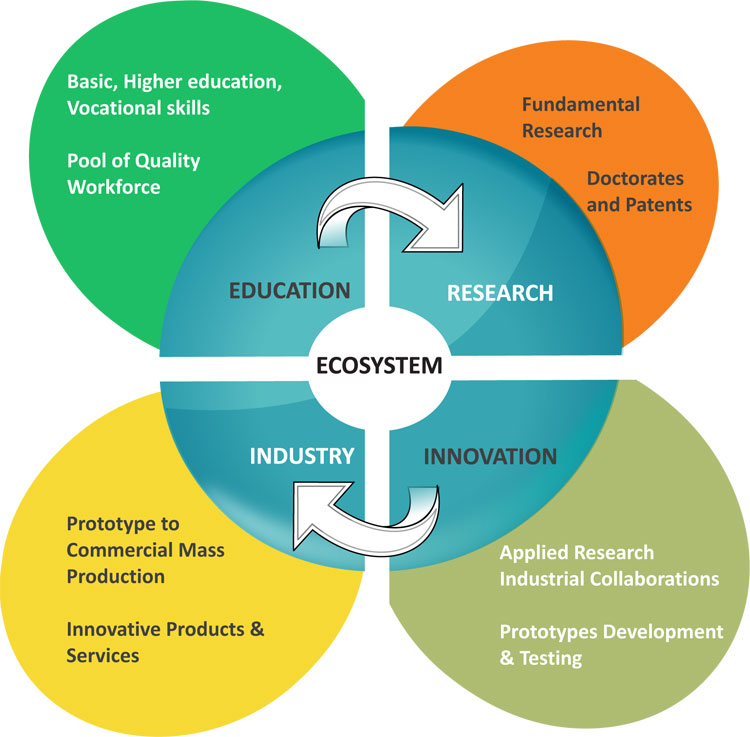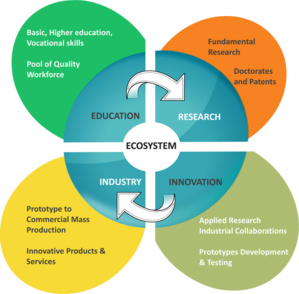Individual understanding and compliance to environmental issues and maintaining bio-diversity across the supply the chain may go a long way, but has very little impact on the world. If corporates subscribe to the said aforementioned belief system, the impact on the environment is then visibly noticeable. It is essential that CEOs understand and subscribe to this belief. However, a quick scan of the world’s largest corporates suggests that few really understand the importance to the urgent need for such environmental concerns.
In the majority of cases for these large organizations the lack of commercial incentive, towards biodiversity and environmental compliances, is the stumbling block. A report published by UK’s independent advisory body called the Natural Capital Committee, linked the degradation of England’s natural environment is directly causing harm to it economy. It proposed an increase in the green cover in all cities so as to improve air quality.
What happens next is going to make the finance guys and those in management guys perk up. The improvement in air quality, the Committee reports, will have beneficial repercussions in the form of money saved on insurance, as well as for the entire National Health Service. The report also mentions the effect of creating wetlands and its impact of farming, transportation and business activities.
Those in management, finance and insurance are accustomed to managing risks. And managing risk is what sustainability is all about. Our natural ecosystem and environment, the place and means to our survival as a species, is at risk. It is in essence our capital. Our ground water, our ecosystems, our soil – these basic ingredients to our planet’s balance sheet, i.e., which sustain life on this planet, and provides it with commercial value that drive our economies and our countries; these natural elements are at risk of depletion today.
A research report by the United Nations, states that one-fifth of our planet’s aquifers are over-exploited. Another report from the World Wildlife Fund (WWF) states that half of the world’s amphibians, birds and reptiles have gone extinct since 1970. The World Economic Forum states that because of our farming methods, nutrients from the topsoil are being rapidly depleted at 10-40 times the rate at which they can be replenished. These massive damages to our environment and to our biodiversity has been quantified by The Economics of Ecosystems and Biodiversity (TEEB). The figure that they have come up with is nothing short of mind blowing. It is 3.3-7.5% of the global GDP.
In its news report, the Cambridge Institute for Sustainability Leadership (CISL) has shown a variety of methods that can help improve the situation. By creating its Natural Capital Leaders Platform, CISL has provided a forum wherein the world’s largest forestry, food and beverage corporates can collaborate, in order to, identify new avenues of commercial opportunity by increasing their understanding of the world’s natural capital.
The coming together of the academia and business and their joint collaboration is likely to lead to safeguards which are key to find that commercial logic which works best with CEOs and in the boardroom.
References:
http://www.csrwire.com/blog/posts/1533-doing-business-with-nature-commercial-logic-is-key-to-business-action-on-natural-capital
In the majority of cases for these large organizations the lack of commercial incentive, towards biodiversity and environmental compliances, is the stumbling block. A report published by UK’s independent advisory body called the Natural Capital Committee, linked the degradation of England’s natural environment is directly causing harm to it economy. It proposed an increase in the green cover in all cities so as to improve air quality.
What happens next is going to make the finance guys and those in management guys perk up. The improvement in air quality, the Committee reports, will have beneficial repercussions in the form of money saved on insurance, as well as for the entire National Health Service. The report also mentions the effect of creating wetlands and its impact of farming, transportation and business activities.
Those in management, finance and insurance are accustomed to managing risks. And managing risk is what sustainability is all about. Our natural ecosystem and environment, the place and means to our survival as a species, is at risk. It is in essence our capital. Our ground water, our ecosystems, our soil – these basic ingredients to our planet’s balance sheet, i.e., which sustain life on this planet, and provides it with commercial value that drive our economies and our countries; these natural elements are at risk of depletion today.
A research report by the United Nations, states that one-fifth of our planet’s aquifers are over-exploited. Another report from the World Wildlife Fund (WWF) states that half of the world’s amphibians, birds and reptiles have gone extinct since 1970. The World Economic Forum states that because of our farming methods, nutrients from the topsoil are being rapidly depleted at 10-40 times the rate at which they can be replenished. These massive damages to our environment and to our biodiversity has been quantified by The Economics of Ecosystems and Biodiversity (TEEB). The figure that they have come up with is nothing short of mind blowing. It is 3.3-7.5% of the global GDP.
In its news report, the Cambridge Institute for Sustainability Leadership (CISL) has shown a variety of methods that can help improve the situation. By creating its Natural Capital Leaders Platform, CISL has provided a forum wherein the world’s largest forestry, food and beverage corporates can collaborate, in order to, identify new avenues of commercial opportunity by increasing their understanding of the world’s natural capital.
The coming together of the academia and business and their joint collaboration is likely to lead to safeguards which are key to find that commercial logic which works best with CEOs and in the boardroom.
References:
http://www.csrwire.com/blog/posts/1533-doing-business-with-nature-commercial-logic-is-key-to-business-action-on-natural-capital






